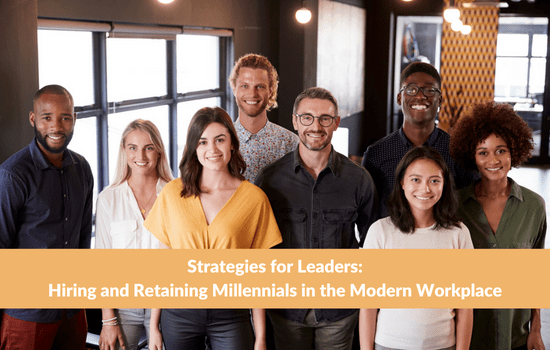To optimize millennials' recruitment, hiring, and retention, gaining a nuanced understanding of their dynamics within the workforce is imperative. This insight is crucial for extracting maximum productivity and contribution from this generation.
The Millennial Advantage: A Blueprint for Recruitment and Retention
 In this blog, I will delve into the profound influence of millennials on the workforce, debunking prevalent misconceptions. I will explore company culture's and emotional intelligence's pivotal role in seamlessly integrating and collaborating with millennials. All of which will change your lens on best practices for recruiting, hiring, and retaining millennials.
In this blog, I will delve into the profound influence of millennials on the workforce, debunking prevalent misconceptions. I will explore company culture's and emotional intelligence's pivotal role in seamlessly integrating and collaborating with millennials. All of which will change your lens on best practices for recruiting, hiring, and retaining millennials.
The Foundation: Research on Millennials
Throughout my research on millennials, I had the privilege of partnering with Lukas Pesa, a seasoned researcher specializing in generational differences and workforce trends. Our collaboration led to the creation of three insightful podcasts, focusing on the intricate relationship between emotional intelligence in millennials and its profound impact on the dynamics of the modern workforce.
Let’s start with the definition, considering ‘millennial’ is a nebulous term for many. According to Wikipedia, “Millennials (also known as the Millennial Generation[1] or Generation Y, abbreviated to Gen Y) are the demographic cohort between Generation X and Generation Z. There are no precise dates for when the generation starts and ends. Demographers and researchers typically use the early 1980s as starting birth years and use the mid-1990s to the early 2000s as final birth years for the Millennial Generation."
Understanding the Uniqueness of Millennials
There are many myths about millennials, so it’s essential to understand what they are because they have recently become the largest generation in the Canadian workforce. We need to get on board, adapt, and learn to respect and work with millennials to continue to succeed and flourish within the workforce.
As we’ve enumerated before, millennials aren’t from a different planet—mostly, they want the same things their parents did. But there are generational differences that will change the way many companies work over the coming years. As employees they are eroding the organizational structures that many of their predecessors took for granted: The traditional office is most squarely in the crosshairs, with 70% of millennial employees saying they’d rather work remotely. (That may be because most offices are awful places to work.) Their early experience of the job market has also been different. Unlike Generation X, unemployment hasn’t been the main problem for the majority of millennials. Instead, underemployment, temporary contract positions, lousy pay and never-ending “internships” have eroded their expectations, and in the process, their sense of loyalty to any given employer.”
Graham makes excellent points that are hard to refute, and I agree with him.
Common Complaints About Millennials
Millennials are a significant portion of the Canadian workforce, but whether they are the largest generation depends on the specific year and demographic shifts. Demographic trends can change over time.
Through my consulting, I often hear many managers speak negatively about millennials. Interestingly they frequently complain about similar things, including:
- Lack of Work Ethic: Some managers may perceive millennials as having a weaker work ethic due to stereotypes about prioritizing work-life balance.
- Impatience: There might be a perception that millennials are more impatient, seeking rapid career progression and instant results.
- Overreliance on Technology: Managers may express concerns about millennials being overly dependent on technology, potentially affecting face-to-face communication skills.
- Desire for Instant Feedback: Millennials often appreciate regular feedback, but some managers may view this as needing constant validation.
- Job-Hopping: Millennials are sometimes associated with frequent job changes, which may be seen as a lack of commitment or loyalty.
It's important to note that these are stereotypes and individuals within any generation can vary widely. Many millennials bring valuable skills, adaptability, and a fresh perspective to the workplace. Providing opportunities to enhance emotional intelligence will positively impact millennials and the entire workforce.
This blog has explored the distinctive characteristics of millennials, debunked prevalent misconceptions and complaints regarding their workplace performance, and delved into the roles of company culture and emotional intelligence in seamlessly integrating and collaborating with this generation. For a deeper dive into this topic, I recommend reading "Future-Proofing Your Team: Smart Strategies for Attracting and Retaining Millennial Talent," which provides comprehensive insights into best practices for recruiting, hiring, and retaining millennials.
This article was originally published on May 7, 2017, and has been updated (February 2024).
More Motivational Reads Here »
How Emotionally Intelligent Are You?
Sign up for monthly tips to build your Emotional Intelligence and reduce Emotional Hijacking!

















